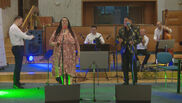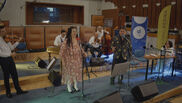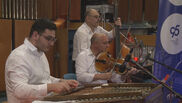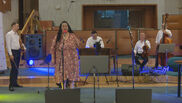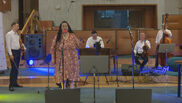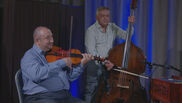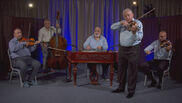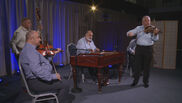The Sendreis Gypsy Band - Take the Viola
created: 18. 06. 2025 08:28 modified: 18. 06. 2025 08:28
The founders of the Sendreiovci Gypsy Band are Vladimír Sendrei and his wife Jana Sendreiová. They founded the Band in 2001 in the village of Kokava nad Rimavicou, the band's original name was Kokavakere lavutara. Their work caught the attention of film music composer Hans Zimmer and became part of the soundtrack of the film Sherlock Holmes: A Game of Shadows. The Band's music also enriched the soundtrack of the Czech film titled Roming.
Jana Sendreiová achieved her personal success when in 2005 she performed together with other soloists at a concert in New York at Carnegie Hall, accompanied by the Roma band Anyalai Gypsy Band.
The song Le, more, e brača was presented on 9.4.2024 during an event from the Live Books series, which took place on the occasion of World Roma Day at RTVS, the Big Studio of Slovak Radio in Košice.
category: music
tags: vocal-instrumental modern folk orchestra borrowed Romani Sendreiovci Gypsy Band general audience internal
The Sendreis Gypsy Band - I got Drunk
created: 17. 06. 2025 13:40 modified: 17. 06. 2025 13:41
The founders of the Sendreiovci Gypsy Band are Vladimír Sendrei and his wife Jana Sendreiová. They founded the Band in 2001 in the village of Kokava nad Rimavicou, the band's original name was Kokavakere lavutara. Their work caught the attention of film music composer Hans Zimmer and became part of the soundtrack of the film Sherlock Holmes: A Game of Shadows. The Band's music also enriched the soundtrack of the Czech film titled Roming.
Jana Sendreiová achieved her personal success when in 2005 she performed together with other soloists at a concert in New York at Carnegie Hall, accompanied by the Roma band Anyalai Gypsy Band.
The song Maťiľom was presented on 9.4.2024 during an event from the Live Books series, which took place on the occasion of World Roma Day at RTVS, the Big Studio of Slovak Radio in Košice.
category: music
tags: vocal-instrumental modern folk orchestra borrowed Romani Sendreiovci Gypsy Band general audience internal
The Sendreis Gypsy Band - Not a Single Musician
created: 17. 06. 2025 12:08 modified: 17. 06. 2025 12:09
The founders of the Sendreiovci Gypsy Band are Vladimír Sendrei and his wife Jana Sendreiová. They founded the Band in 2001 in the village of Kokava nad Rimavicou, the band's original name was Kokavakere lavutara. Their work caught the attention of film music composer Hans Zimmer and became part of the soundtrack of the film Sherlock Holmes: A Game of Shadows. The Band's music also enriched the soundtrack of the Czech film titled Roming.
Jana Sendreiová achieved her personal success when in 2005 she performed together with other soloists at a concert in New York at Carnegie Hall, accompanied by the Roma band Anyalai Gypsy Band.
The song Maťiľom was presented on 9.4.2024 during an event from the Live Books series, which took place on the occasion of World Roma Day at RTVS, the Big Studio of Slovak Radio in Košice.
category: music
tags: vocal-instrumental modern folk orchestra borrowed Romani Sendreiovci Gypsy Band general audience internal
The Sendreis Gypsy Band - I am Black, I am Black
created: 17. 06. 2025 10:28 modified: 17. 06. 2025 10:28
The founders of the Sendreiovci Gypsy Band are Vladimír Sendrei and his wife Jana Sendreiová. They founded the Band in 2001 in the village of Kokava nad Rimavicou, the band's original name was Kokavakere lavutara. Their work caught the attention of film music composer Hans Zimmer and became part of the soundtrack of the film Sherlock Holmes: A Game of Shadows. The Band's music also enriched the soundtrack of the Czech film titled Roming.
Jana Sendreiová achieved her personal success when in 2005 she performed together with other soloists at a concert in New York at Carnegie Hall, accompanied by the Roma band Anyalai Gypsy Band.
The song Kaľi som, kaľi som was presented on 9.4.2024 during an event from the Live Books series, which took place on the occasion of World Roma Day at RTVS, the Big Studio of Slovak Radio in Košice.
category: music
tags: vocal-instrumental modern folk orchestra borrowed Romani Sendreiovci Gypsy Band general audience internal
The Sendreis Gypsy Band - Her Hair / You, Girl
created: 17. 06. 2025 07:56 modified: 17. 06. 2025 07:57
The founders of the Sendreiovci Gypsy Band are Vladimír Sendrei and his wife Jana Sendreiová. They founded the Band in 2001 in the village of Kokava nad Rimavicou, the band's original name was Kokavakere lavutara. Their work caught the attention of film music composer Hans Zimmer and became part of the soundtrack of the film Sherlock Holmes: A Game of Shadows. The Band's music also enriched the soundtrack of the Czech film titled Roming.
Jana Sendreiová achieved her personal success when in 2005 she performed together with other soloists at a concert in New York at Carnegie Hall, accompanied by the Roma band Anyalai Gypsy Band.
The songs Lakere bala and U tu čhaje were presented on 9.4.2024 during an event from the Live Books series, which took place on the occasion of World Roma Day at RTVS, the Big Studio of Slovak Radio in Košice.
category: music
tags: vocal-instrumental modern folk orchestra borrowed Romani Sendreiovci Gypsy Band general audience internal
Peter Balogh Orchestra Hallelujah to You
created: 30. 04. 2025 13:37 modified: 30. 04. 2025 13:43
Peter Balogh Orchestra is a musical ensemble founded in 2017, founded and artistic director is violinist Peter Balogh Sr. The members of the orchestra are from Slovakia and Hungary, they perform not only in Slovakia, but also in various countries of Europe and Asia. The orchestra's repertoire includes a wide range of genres, but mainly film music, operetta, jazz, Slovak and Hungarian folklore and so-called evergreens.
The composition February Love was composed by the Hungarian composer and violinist Járóka Sándor Jr. The instrumental composition presents a strong violin solo and the elements of Romani music characteristic of Hungary. The piece is popular for its emotional melody and virtuoso violin passages.
The recording was made on August 16, 2023 in M Arena in Prešov, it is part of the documentation of Roma cimbalom bands within the framework of DICRK activities.
Instruments and cast:
Peter Balogh Sr. - violin, the lead violin
Peter Balogh Jr. - the second violin
Jónás Géze - cimbalom
Bakoš Kálmán - viola
Sarközy Pál - double bass
category: music
tags: instrumental modern folk borrowed Peter Balogh Orchestra general audience internal
Peter Balogh Orchestra I Have a Hat with a Green Ribbon
created: 30. 04. 2025 11:48 modified: 30. 04. 2025 11:48
Peter Balogh Orchestra is a musical ensemble founded in 2017, founded and artistic director is violinist Peter Balogh Sr. The members of the orchestra are from Slovakia and Hungary, they perform not only in Slovakia, but also in various countries of Europe and Asia. The orchestra's repertoire includes a wide range of genres, but mainly film music, operetta, jazz, Slovak and Hungarian folklore and so-called evergreens.
The composition February Love was composed by the Hungarian composer and violinist Járóka Sándor Jr. The instrumental composition presents a strong violin solo and the elements of Romani music characteristic of Hungary. The piece is popular for its emotional melody and virtuoso violin passages.
The recording was made on August 16, 2023 in M Arena in Prešov, it is part of the documentation of Roma cimbalom bands within the framework of DICRK activities.
Instruments and cast:
Peter Balogh Sr. - violin, the lead violin
Peter Balogh Jr. - the second violin
Jónás Géze - cimbalom
Bakoš Kálmán - viola
Sarközy Pál - double bass
category: music
tags: instrumental modern folk borrowed Peter Balogh Orchestra general audience internal
Peter Balogh Orchestra My Dear Mother Advised Me Greatly There is no Better Musician
created: 30. 04. 2025 11:30 modified: 02. 05. 2025 13:33
Peter Balogh Orchestra is a musical ensemble founded in 2017, founded and artistic director is violinist Peter Balogh Sr. The members of the orchestra are from Slovakia and Hungary, they perform not only in Slovakia, but also in various countries of Europe and Asia. The orchestra's repertoire includes a wide range of genres, but mainly film music, operetta, jazz, Slovak and Hungarian folklore and so-called evergreens.
The composition February Love was composed by the Hungarian composer and violinist Járóka Sándor Jr. The instrumental composition presents a strong violin solo and the elements of Romani music characteristic of Hungary. The piece is popular for its emotional melody and virtuoso violin passages.
The recording was made on August 16, 2023 in M Arena in Prešov, it is part of the documentation of Roma cimbalom bands within the framework of DICRK activities.
Instruments and cast:
Peter Balogh Sr. - violin, the lead violin
Peter Balogh Jr. - the second violin
Jónás Géze - cimbalom
Bakoš Kálmán - viola
Sarközy Pál - double bass
category: music
tags: instrumental modern folk borrowed Peter Balogh Orchestra general audience internal
Peter Balogh Orchestra God punishes
created: 29. 04. 2025 09:49 modified: 29. 04. 2025 09:56
Peter Balogh Orchestra is a musical ensemble founded in 2017, founded and artistic director is violinist Peter Balogh Sr. The members of the orchestra are from Slovakia and Hungary, they perform not only in Slovakia, but also in various countries of Europe and Asia. The orchestra's repertoire includes a wide range of genres, but mainly film music, operetta, jazz, Slovak and Hungarian folklore and so-called evergreens.
The composition February Love was composed by the Hungarian composer and violinist Járóka Sándor Jr. The instrumental composition presents a strong violin solo and the elements of Romani music characteristic of Hungary. The piece is popular for its emotional melody and virtuoso violin passages.
The recording was made on August 16, 2023 in M Arena in Prešov, it is part of the documentation of Roma cimbalom bands within the framework of DICRK activities.
Instruments and cast:
Peter Balogh Sr. - violin, the lead violin
Peter Balogh Jr. - the second violin
Jónás Géze - cimbalom
Bakoš Kálmán - viola
Sarközy Pál - double bass
category: music
tags: instrumental modern orchestra folk borrowed Peter Balogh Orchestra general audience internal
Peter Balogh Orchestra I Lost Al
created: 29. 04. 2025 09:40 modified: 29. 04. 2025 09:56
Peter Balogh Orchestra is a musical ensemble founded in 2017, founded and artistic director is violinist Peter Balogh Sr. The members of the orchestra are from Slovakia and Hungary, they perform not only in Slovakia, but also in various countries of Europe and Asia. The orchestra's repertoire includes a wide range of genres, but mainly film music, operetta, jazz, Slovak and Hungarian folklore and so-called evergreens.
The composition February Love was composed by the Hungarian composer and violinist Járóka Sándor Jr. The instrumental composition presents a strong violin solo and the elements of Romani music characteristic of Hungary. The piece is popular for its emotional melody and virtuoso violin passages.
The recording was made on August 16, 2023 in M Arena in Prešov, it is part of the documentation of Roma cimbalom bands within the framework of DICRK activities.
Instruments and cast:
Peter Balogh Sr. - violin, the lead violin
Peter Balogh Jr. - the second violin
Jónás Géze - cimbalom
Bakoš Kálmán - viola
Sarközy Pál - double bass
category: music
tags: instrumental modern orchestra folk borrowed Peter Balogh Orchestra general audience internal




